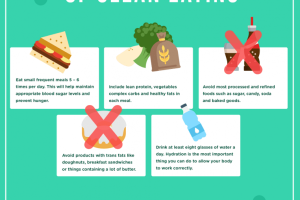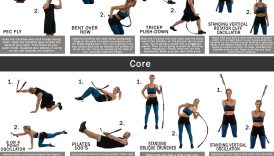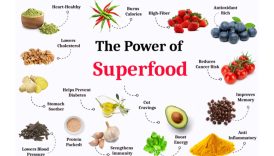Eating Clean: The Key to Radiant Health and Vitality

Why Eating Clean is Important
Eating clean isn’t just a trend; it’s a lifestyle choice that significantly impacts overall well-being. When people choose whole, unprocessed foods, they often notice improvements in their health, energy levels, and mood. For instance, a friend of mine switched to clean eating and found herself with more energy for her workouts, leading to her completing her first half-marathon.
- Eating Clean: The Key to Radiant Health and Vitality
- Why Eating Clean is Important
- Benefits of Eating Clean
- Understanding Clean Eating
- What is Clean Eating?
- Principles of Clean Eating
- How to Start Eating Clean
- Tips for Transitioning to a Clean Eating Lifestyle
- Planning Balanced Clean Meals
- Key Components of Clean Eating
- Importance of Whole Foods
- The Role of Organic and Locally Sourced Ingredients
- Clean Eating Myths Debunked
- Common Misconceptions about Clean Eating
- The Truth Behind Clean Eating Trends
- Clean Eating on a Budget
- Tips for Affordable Clean Eating
- Making Smart Choices at the Grocery Store
- Clean Eating and Weight Management
- How Clean Eating Supports Weight Loss
- Maintaining a Healthy Weight through Clean Eating
- Clean Eating for Improved Energy
- Foods that Boost Energy Levels
- The Connection Between Clean Eating and Increased Energy
- Clean Eating for Better Skin and Hair
- Nutrients for Radiant Skin
- Foods that Promote Healthy Hair
- Clean Eating and Mental Clarity
- The Impact of Diet on Cognitive Function
- Foods that Support Brain Health
- Clean Eating for Enhanced Athletic Performance
- Fueling Workouts with Clean Foods
- Recovery Foods for Active Lifestyles
- Sustaining Clean Eating Habits
- Overcoming Challenges in Clean Eating
- Building Long-Term Healthy Eating Habits
- Clean Eating and Gut Health
- Importance of a Healthy Gut Microbiome
- Foods for Gut Health
- Clean Eating and Immune System Support
- Nutrients that Boost Immunity
- Building a Strong Immune System through Clean Eating
- Conclusion
- The Long-Term Benefits of Eating Clean
- Taking the First Steps towards a Cleaner, Healthier Lifestyle
Benefits of Eating Clean
The advantages of clean eating are numerous and multifaceted. Here are some key benefits:
- Weight Management: Helps maintain a healthy weight by reducing reliance on processed foods.
- Increased Energy Levels: Provides a steady supply of nutrients that fuel the body.
- Better Digestive Health: Whole foods are rich in fiber, promoting a healthy gut.
- Enhanced Mental Clarity: Nutritious meals can improve focus and cognitive functioning.
By adopting a clean eating approach, individuals can experience these benefits and pave the way to a healthier lifestyle.
Understanding Clean Eating
What is Clean Eating?
Clean eating refers to the consumption of whole, minimally processed foods. It emphasizes nourishing the body with ingredients as close to their natural state as possible. Imagine biting into a ripe apple or savoring a freshly grilled vegetable; that’s clean eating at its core. It’s not a strict diet but rather a lifestyle choice that encourages mindfulness about food.
Principles of Clean Eating
There are several key principles that underpin clean eating:
- Whole Foods: Focus on fruits, vegetables, whole grains, nuts, seeds, and lean proteins.
- Minimize Processed Foods: Avoid packaged items laden with additives and preservatives.
- Seasonal and Local: Whenever possible, choose organic and locally sourced ingredients for flavor and sustainability.
- Mindful Eating: Pay attention to hunger cues and savor meals without distractions.
By adhering to these principles, individuals can cultivate healthier eating habits that lead to lasting benefits.
How to Start Eating Clean
Tips for Transitioning to a Clean Eating Lifestyle
Embarking on a clean eating journey can be transformative, but it doesn’t have to be overwhelming. Start small by substituting processed snacks with healthier options, like fruits or nuts. A friend of mine gradually switched out sugary cereals for oatmeal topped with fresh berries, and she couldn’t believe the difference it made in her energy levels. Here are some tips to ease the transition:
- Start Slowly: Incorporate one clean meal per week and gradually increase.
- Read Labels: Familiarize yourself with ingredient lists to avoid hidden additives.
- Meal Prep: Spend a few hours prepping meals for the week to ensure you have healthy options ready.
Planning Balanced Clean Meals
To create balanced meals, it’s essential to include a good mix of macronutrients:
- Proteins: Choose lean meats, fish, eggs, or plant-based sources like beans and lentils.
- Carbohydrates: Opt for whole grains such as quinoa, brown rice, or whole grain bread.
- Fats: Incorporate healthy fats like avocados, olive oil, or nuts.
By planning meals with these components, you’ll be on your way to maintaining a clean diet that leaves you feeling satisfied and energized!
Key Components of Clean Eating
Importance of Whole Foods
Whole foods are the backbone of clean eating, as they provide essential nutrients without unnecessary additives. These are the foods that exist in nature and are free from artificial ingredients and processing. For example, swapping out snack chips for a handful of almonds or a fresh carrot can make a world of difference in your nutrition. Whole foods are not only more nutritious but also more satisfying, which can help curb unhealthy cravings. Key benefits of whole foods include:
- Higher Nutrient Density: Rich in vitamins, minerals, and antioxidants.
- Supports Digestive Health: Fiber from whole foods promotes healthy digestion.
- Boosts Metabolism: Natural foods require more energy to process.
The Role of Organic and Locally Sourced Ingredients
Incorporating organic and locally sourced ingredients enhances clean eating significantly. Organic foods are cultivated without harmful pesticides or synthetic fertilizers, making them a healthier choice. Moreover, locals often benefit from supporting nearby farmers, reducing environmental impacts from transportation. Consider these advantages:
- Flavor and Freshness: Local produce is usually picked at peak ripeness, ensuring maximum flavor and nutrients.
- Sustainability: Supporting local farms contributes to local economies and reduces carbon footprints.
- Limited Additives: Organic products generally have fewer preservatives and artificial ingredients.
By emphasizing whole, organic, and local foods in your meals, you’ll not only enjoy better health but also support sustainable practices.
Clean Eating Myths Debunked
Common Misconceptions about Clean Eating
As clean eating gains popularity, several myths often cloud its true essence. One common misconception is that clean eating is all about strict diets and deprivation. In reality, clean eating emphasizes balance and enjoyment. A friend once told me she thought she had to give up dessert entirely; instead, she learned to make healthier treats using natural sweeteners. Here are some myths clarified:
- Myth 1: Clean eating is expensive. Truth: It can be budget-friendly by focusing on seasonal produce and bulk grains.
- Myth 2: You must eliminate all carbohydrates. Truth: Including whole grains is essential for balanced energy.
The Truth Behind Clean Eating Trends
Another trend is the belief that clean eating requires excessive time and effort. However, meal prepping and simple recipes can streamline the process. Clean eating is truly about making informed choices rather than adhering to rigid rules. Other truths to consider include:
- Quality over Quantity: It’s about choosing wholesome foods rather than counting calories.
- Flexibility: Clean eating allows for occasional treats, making it more sustainable long-term.
By understanding these misconceptions and truths, individuals can embrace a more holistic and enjoyable approach to clean eating.
Clean Eating on a Budget
Tips for Affordable Clean Eating
Embracing clean eating doesn’t have to break the bank. Many people, including my cousin, have found ways to enjoy nutritious meals without overspending. The key is to be strategic and resourceful. Here are some practical tips for affordable clean eating:
- Buy in Bulk: Purchase whole grains, nuts, and seeds in larger quantities to save money.
- Plan Meals: Create a weekly meal plan to minimize food waste and unnecessary purchases.
- Cook at Home: Preparing meals yourself is generally cheaper than eating out.
Making Smart Choices at the Grocery Store
When shopping, being mindful of your choices is crucial. Here are some smart strategies:
- Choose Seasonal Produce: Fruits and vegetables that are in season are not only fresher but also more affordable.
- Look for Sales and Discounts: Keep an eye on sales for organic and whole food options—you might score some great deals!
- Compare Store Brands: Often, store brands offer the same quality as name brands but at a reduced price.
Adopting these practices can make clean eating accessible for anyone, proving that a healthy lifestyle can fit any budget!
Clean Eating and Weight Management
How Clean Eating Supports Weight Loss
Clean eating is a powerful ally in the quest for weight loss. By focusing on whole foods, you provide your body with the nutrients it craves while avoiding empty calories found in processed snacks. For instance, a friend of mine lost weight by swapping sugary sodas for herbal teas and replacing chips with crunchy carrots and hummus. Here are some key ways clean eating supports weight loss:
- Nutrient Density: Whole foods are nutrient-rich, helping you feel full and satisfied.
- Reduced Cravings: Less refined sugars means fewer sugar spikes and dips, leading to steadier energy levels.
- Mindful Eating: Focusing on clean foods encourages better portion control.
Maintaining a Healthy Weight through Clean Eating
Once weight loss goals are achieved, clean eating becomes essential for weight maintenance. Embracing a lifestyle that prioritizes nutritious foods enables you to easily manage your weight. Consider these practices:
- Balanced Meals: Continue to focus on portions of lean proteins, whole grains, and plenty of fruits and vegetables.
- Stay Active: Pair clean eating with regular physical activity for optimal results.
- Listen to Your Body: Tune in to hunger cues and eat when you’re genuinely hungry.
By incorporating clean eating habits into daily life, maintaining a healthy weight becomes not only achievable but also sustainable!
Clean Eating for Improved Energy
Foods that Boost Energy Levels
Eating clean is a fantastic way to enhance energy levels throughout the day. Incorporating nutrient-dense foods can provide your body with the fuel it needs. For example, oatmeal topped with berries and nuts can keep energy levels steady during morning workouts. Here are some energy-boosting foods to consider:
- Quinoa: A high-protein grain that provides sustained energy.
- Leafy Greens: Foods like spinach and kale are packed with iron and vitamins.
- Nuts and Seeds: Almonds and chia seeds are both great sources of good fats and protein.
The Connection Between Clean Eating and Increased Energy
The relationship between clean eating and energy is profound. By prioritizing whole foods and minimizing processed options, individuals often experience fewer energy crashes throughout the day. A colleague of mine noticed that after cutting out refined sugars, her energy remained consistent, allowing her to stay productive and focused. Key connections include:
- Stable Blood Sugar Levels: Clean foods prevent rapid spikes and drops in blood sugar.
- Hydration: Whole foods often contain more water, aiding in hydration which is essential for energy.
- Essential Nutrients: Nutrient-rich foods support metabolic functions, optimizing energy production.
By adopting clean eating habits, people can experience a remarkable boost in their energy levels—leading to a more vibrant and active lifestyle!
Clean Eating for Better Skin and Hair
Nutrients for Radiant Skin
The impact of clean eating extends beyond weight management and energy levels; it also plays a significant role in achieving radiant skin. Including nutrient-rich foods ensures the body receives the vitamins and antioxidants essential for skin health. For example, after incorporating more fruits and vegetables, a friend noticed her skin appeared brighter and clearer. Key nutrients for healthy skin include:
- Vitamin C: Found in citrus fruits and bell peppers, it aids in collagen production.
- Omega-3 Fatty Acids: Walnuts and flaxseeds help maintain skin hydration.
- Antioxidants: Berries and leafy greens combat free radicals, reducing signs of aging.
Foods that Promote Healthy Hair
When it comes to healthy hair, clean eating can make a real difference too. A balanced diet rich in specific nutrients promotes stronger, shinier hair. I once switched to a diet filled with whole foods and was amazed at how much my hair improved in texture! Here are some beneficial foods for hair health:
- Biotin-rich Foods: Eggs and nuts are excellent for promoting hair growth.
- Iron Sources: Spinach and legumes help supply oxygen to hair follicles.
- Protein: Lean meats and beans support hair structure.
By prioritizing the right nutrients and foods through clean eating, one can achieve not only beautiful skin but also luscious, healthy hair!
Clean Eating and Mental Clarity
The Impact of Diet on Cognitive Function
Clean eating plays a crucial role in enhancing mental clarity and overall cognitive function. What we consume directly affects our brain’s health and performance. For instance, after I started prioritizing whole foods, I noticed my ability to focus improved, especially during long work hours. Studies have shown that a nutrient-dense diet can help:
- Enhance Memory: Foods rich in omega-3 fatty acids support memory functions.
- Increase Focus: A diet low in refined sugars helps maintain steady energy levels, reducing distractions.
- Improve Mood: Balanced nutrition can alleviate anxiety and promote emotional stability.
Foods that Support Brain Health
Incorporating specific brain-boosting foods into a clean eating regimen can significantly enhance mental clarity. Consider including the following:
- Fatty Fish: Salmon and sardines are packed with omega-3s, important for brain function.
- Berries: Blueberries are rich in antioxidants, which can improve memory and cognitive skills.
- Dark Chocolate: A small amount can boost mood and increase blood flow to the brain.
By embracing clean eating and focusing on brain-healthy foods, individuals can not only improve mental clarity but also enhance their overall cognitive performance!
Clean Eating for Enhanced Athletic Performance
Fueling Workouts with Clean Foods
Clean eating can significantly enhance athletic performance by providing the right fuel for workouts. Athletes often find that when they consume whole, nutrient-dense foods, their stamina and endurance increase. For instance, a fellow runner I know swears by a pre-workout meal of oatmeal topped with banana and almond butter, as it gives her sustained energy for her long runs. Here are some key clean foods to fuel workouts:
- Complex Carbohydrates: Brown rice and quinoa provide lasting energy.
- Lean Proteins: Grilled chicken or lentils help with muscle repair.
- Healthy Fats: Avocados and nuts support overall energy levels.
Recovery Foods for Active Lifestyles
Post-workout nutrition is just as crucial as pre-workout meals. After a rigorous training session, replenishing energy and nutrients is essential for recovery. A friend of mine found that smoothies loaded with spinach, protein powder, and berries help him recover quickly after tough gym sessions. Consider these recovery foods:
- Protein Shakes: A quick and convenient source of protein for muscle recovery.
- Greek Yogurt with Fruits: Provides protein and antioxidants to reduce inflammation.
- Sweet Potatoes: Rich in carbohydrates and vitamins, they help replenish glycogen stores.
By focusing on clean foods for both fueling workouts and aiding recovery, athletes can enhance their performance and maintain an active lifestyle!
Sustaining Clean Eating Habits
Overcoming Challenges in Clean Eating
Maintaining clean eating habits can pose some challenges, but recognizing these obstacles is the first step toward overcoming them. For instance, social gatherings often present temptations, but bringing a healthy dish to share can alleviate pressure. When my friend faced difficulty avoiding processed snacks during movie nights, she started creating homemade alternatives, like air-popped popcorn seasoned with herbs. Here are some common challenges and strategies to overcome them:
- Time Constraints: Meal prep on weekends to save time during busy weekdays.
- Cravings: Identify triggers and find healthy substitutes to satisfy cravings.
Building Long-Term Healthy Eating Habits
Creating sustainable clean eating habits is more about making gradual adjustments rather than drastic changes. Building these habits takes time and consistency. I found success by introducing one new clean recipe each week, making it easier to incorporate various foods into my diet. To foster long-lasting habits:
- Track Progress: Use a food journal to identify what works and what doesn’t.
- Stay Flexible: Allow room for occasional indulgences without guilt.
- Educate Yourself: Learn about nutrition to make informed food choices.
By addressing challenges and focusing on building healthy habits, clean eating can easily become a rewarding lifestyle choice!
Clean Eating and Gut Health
Importance of a Healthy Gut Microbiome
A healthy gut microbiome is essential for overall well-being, as it plays a vital role in digestion, immunity, and even mood regulation. A friend of mine struggled with digestive issues until she learned about the importance of gut health and made dietary changes. She discovered that incorporating clean, whole foods made a significant difference in her digestion and energy levels. Here are key reasons why a healthy gut microbiome matters:
- Nutrient Absorption: A balanced gut helps improve nutrient absorption from food.
- Immune Function: A strong microbiome supports the body’s immune response.
- Mental Health: Studies show a connection between gut health and mood regulation.
Foods for Gut Health
To support gut health, clean eating can introduce various foods rich in probiotics and prebiotics. These help to maintain a balanced gut microbiome. For example, I started adding fermented foods to my meals and noticed better digestion and fewer bloating episodes. Consider these gut-friendly foods:
- Fermented Foods: Yogurt, kefir, sauerkraut, and kimchi are rich in probiotics.
- High-Fiber Foods: Whole grains, lentils, and fruits help nourish good bacteria.
- Prebiotic Foods: Garlic, onions, and asparagus support the growth of healthy gut flora.
Incorporating these foods into a clean eating regimen can significantly enhance gut health, leading to overall improvements in well-being!
Clean Eating and Immune System Support
Nutrients that Boost Immunity
Eating clean is not only beneficial for physical health and energy; it also plays a significant role in supporting the immune system. I noticed a remarkable difference in my health when I incorporated more immune-boosting foods into my diet, especially during cold and flu seasons. Certain nutrients are particularly effective in enhancing immunity. Key nutrients include:
- Vitamin C: Found in citrus fruits, strawberries, and bell peppers, it helps to strengthen the immune response.
- Vitamin D: Available in fatty fish and fortified foods, it plays a crucial role in immune function.
- Zinc: Nuts, seeds, and legumes provide this important mineral that supports immune cells.
Building a Strong Immune System through Clean Eating
To build a robust immune system, clean eating continues to be a game-changer. By focusing on whole foods and nutrient diversity, individuals create a diet that supports overall health and resilience. For example, when I prioritized whole grains and colorful vegetables, I noticed fewer instances of illness. Consider these strategies:
- Varied Diet: Incorporate a range of fruits, vegetables, lean proteins, and whole grains to ensure you get all necessary nutrients.
- Stay Hydrated: Drink plenty of water and herbal teas to help flush out toxins.
- Limit Processed Foods: Reducing refined sugars and unhealthy fats can greatly improve immune response.
By combining these practices within a clean eating framework, one can cultivate a strong immune system that helps fend off illness and maintain overall health!
Conclusion
The Long-Term Benefits of Eating Clean
Transitioning to a clean eating lifestyle can yield numerous long-term benefits that extend beyond physical health. When I first started my journey, the improvements were apparent in my energy levels, mood, and even my skin quality. Over time, I noticed that clean eating significantly reduced my risk of chronic diseases, improved my mental clarity, and helped maintain a healthy weight. The most notable long-term benefits include:
- Enhanced Well-Being: Improved mood and reduced stress levels.
- Increased Energy: Sustained energy for daily activities and workouts.
- Better Digestive Health: A more balanced gut microbiome and fewer digestive issues.
Taking the First Steps towards a Cleaner, Healthier Lifestyle
Embarking on a clean eating journey might seem daunting, but starting with small, manageable changes can make a difference. Begin by identifying one or two unhealthy eating habits to replace with cleaner alternatives, such as swapping out soda for herbal tea or incorporating more fruits and vegetables into your meals. To get started:
- Set Realistic Goals: Aim for gradual changes rather than overnight transformations.
- Stay Informed: Educate yourself about nutritious foods and their benefits.
- Reflect on Progress: Keep a journal to track your journey and celebrate small victories.
By taking these first steps toward clean eating, anyone can pave the way to a healthier, more vibrant lifestyle that lasts a lifetime!


